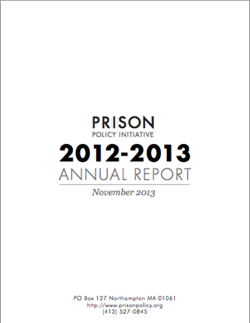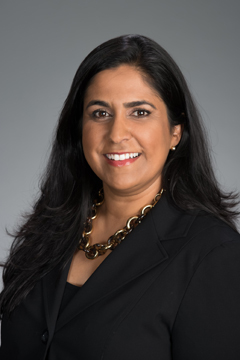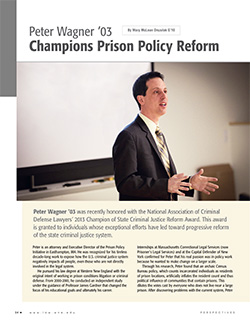From ending prison gerrymandering to protecting families from exploitative prison phone companies, 2013 has been a watershed year for the Prison Policy Initiative.
by Peter Wagner,
November 27, 2013

As we head into Thanksgiving weekend with family and friends, here at the Prison Policy Initiative we’re taking this opportunity to celebrate how much we’ve achieved in the past year and express our enormous gratitude to our colleagues and supporters who make it all possible. As our new annual report shows, this year we’ve accomplished more than ever on a growing number of campaigns. Here are some highlights:
- Our work to end prison gerrymandering sparked legislation in eight states and passed in two, more than 200 local governments have solved the problem on their own, and the issue got news coverage in hundreds of articles and editorials including a New York Times editorial. And the Census Bureau, which encourages states to engage in prison gerrymandering by counting incarcerated people at correctional facilities, is finally signaling that it is open to changing the practice.
- This year we took on the exploitative prison phone industry, releasing two reports and a video, and co-coordinating a petition that changed the pace of the movement for fair phone charges for the families of incarcerated people. In August, after ten years of inaction, the Federal Communications Commission finally voted to regulate the industry so that families will no longer have to pay $1/minute to stay in touch with incarcerated loved ones.
- We also stepped up to the plate to bring an end to the latest harmful fad in local jails: banning letters from home. Our groundbreaking report on why banning families from writing to loved ones in jail is harmful and counterproductive was called “required reading” by the National Institute of Corrections, and helped a grassroots campaign in Santa Clara California halt the local sheriff’s letter ban proposal.
- Our work to reduce the harm of over-broad geography-based sentencing policies helped win some important victories this year, including a legal victory for improved sentencing practice in Massachusetts, and overturning a counterproductive banishment ordinance in a Colorado city.
- Our Research Clearinghouse of empirical criminal justice research is larger than ever, and our Legal resource list for incarcerated people continues to offer up-to-date information to those who need it.
As you can see, we’ve been busier than ever this year to expose and ameliorate the broader harm of mass incarceration. But none of this would be possible without the support of a core group of individual donors and a handful of committed foundations. Can you make a tax-deductible donation to support our work so that we can take full advantage of this incredible momentum in 2014? Every gift we receive before the end of the year will be matched by a generous group of donors, so your gift will go twice as far.
And finally, please stay in touch with us this year! You can drop us a line at any time, we’ve added two new e-newsletters you can use to keep track of what we’re up to (sign up for one or all at at http://www.prisonpolicy.org), and you can follow us on Facebook and Twitter as well.
Thank you for your partnership in this movement!
The FCC denies prison phone companies’ petitions to delay implementing fair rates, reiterating the need for regulation.
by Aleks Kajstura,
November 26, 2013
Before the FCC’s new regulations lowering the price of calls home from prison even hit the Federal Register, the two largest prison phone companies (Securus and GTL) filed petitions to delay implementation of the new rules while they fight the regulations in court.
But the FCC isn’t backing down. The FCC denied the companies’ petitions, reiterating the need for regulation. Here are the highlights:
As the Commission stated in the Inmate Calling Report and Order and FNPRM, current interstate ICS rates are, in most cases, greatly above costs, and as such, “place an unreasonable burden on some of the most economically disadvantaged people in our nation.” The Commission noted that excessively high ICS rates “discourage communication between inmates and their families and larger support networks.” (¶ 48)
Section 201 of the Communications Act of 1934, as amended (Act) requires that all carriers’ interstate rates be just and reasonable. To be just and reasonable, rates must be related to the cost of providing service. Section 276 additionally requires that payphone rates be fair. Yet for many years, interstate ICS rates have been unreasonably high, unfair, and far in excess of the cost of providing service. Excessive rates have been driven largely by substantial commission payments ICS providers have agreed to make to prison authorities. The Commission relies in the first instance on competition when it can do so to ensure just and reasonable rates. In the Inmate Calling Report and Order and FNPRM the Commission found that “competition for ICS contracts may actually tend to increase the rate levels in ICS contract bids where site commission size is a factor in evaluating bids.” As such, the Commission found that the market forces in the interstate ICS market actually fail to constrain ICS rates. In fact, because the benefits of any “competition” in the ICS market ran to the facility rather than the inmate or their family (i.e., the party who actually paid for the service), rates in many cases were being driven higher. (¶ 3)
The Order also makes clear that regulating ancillary fees “was a necessary aspect of our cost-based reforms, as otherwise providers could simply increase their ancillary charges to offset lower rates subject to our caps.” (¶ 15)
Securus argues that it will suffer significant lost revenues under the new ICS rate regime. The new rules may reduce Securus’ revenue compared to pre-reform levels. But, to the extent that is true, it is because its current revenues are the product of unlawfully high rates. (¶ 35, emphasis added)
And on a technical note, the FCC points out Securus’ hypocrisy:
While Securus faults the Order for ignoring record evidence that the cost of serving some of its facilities is higher than the interim rate caps, Securus’ own cost study underscores the fact that averaged pricing is commonplace among ICS providers, as it is among communications providers generally. The Siwek Report shows that the rates Securus charges for the highest cost institutions fail to recover its self-identified costs of serving those institutions. It indicates that the average cost for “Low 10” group of institutions it serves is $1.71 per minute but that on average Securus charges only $1.10 per minute for calls from these same institutions. Securus does not contend that it is not profitable as a whole or that because its current rates do not cover the cost of serving its Low 10 facilities, it will be obliged to cease serving these locations. (¶ 27)
Neelum Arya, Research Director at the David J. Epstein Program in Public Interest Law and Policy at UCLA School of Law, shares her work and why she joined PPI's board.
by Leah Sakala,
November 21, 2013
Neelum Arya is Research Director of the David J. Epstein Program in Public Interest Law and Policy at UCLA School of Law. Prior to joining UCLA she was the Research and Policy Director for the Campaign for Youth Justice, a national nonprofit devoted to removing youth from the adult criminal justice system. She has published extensively about the dangers of incarceration for youth focusing on the impact on families and communities of color. For her work she was named a Harvard Wasserstein Public Interest Fellow in 2011. Neelum joined the PPI board in 2012.

Why did you join the Prison Policy Initiative board?
Neelum Arya: I have admired PPI for a long time, starting with their work on prison gerrymandering. I joined the Board to help PPI expand their reach to new constituencies. If you are active in the justice-reform movement you are aware of PPI and rely on their work. I joined the Board to help bring more people into the movement.
What’s unique about PPI?
NA: PPI is a nimble organization that always seems to be on the cutting edge of identifying ways that we are harmed by mass incarceration. They produce amazing reports with critical information and graphics, and then get the word out through traditional media and social media. Plus they are fast, fast, fast.
What’s something that most people don’t know about PPI?
NA: Most people probably don’t know that PPI is a small nonprofit based in Western Massachusetts. Given the amount of work that PPI produces, I think most people think PPI is a much bigger organization based in New York or DC.
Heather Ann Thompson, professor in the Departments of African American Studies and History at Temple University, shares her work and why she joined PPI's board.
by Leah Sakala,
November 21, 2013
Heather Ann Thompson is an associate professor of history in the Department of African-American Studies and the Department of History at Temple University. She is currently writing the first comprehensive history of the Attica Prison Rebellion of 1971, and also writes regularly on the current crisis of incarceration. She joined the PPI board in 2012.

What research projects are you currently working on?
Heather Ann Thompson: I am completing a history of the Attica Prison uprising of 1971 for Pantheon books. I’m also continuing to write contemporary pieces on the current incarceration crisis and the history of how we got here.
How have you used the PPI Research Clearinghouse in your scholarship?
HT: PPI’s Research Clearinghouse has been invaluable to the talks that I have been giving around the nation as well as in other countries on the carceral crisis. When I speak of the ways in which incarceration impacts communities in various states, for example, I rely on the important research PPI provides in that regard. I also cite PPI research regularly in the contemporary pieces that I write on this issue. My latest piece in the Atlantic depended on the important work PPI has done on prison gerrymandering.
How can other academics and advocates benefit from the Research Clearinghouse as well?
HT: For academics who seek to remain abreast of the most important research out on the carceral state and the criminal justice system, there is no site better for them to check regularly than the PPI site. Not only will they find an endless supply of articles and reports that will help their own scholarship to be better informed and completely up to date, but they will also find original research done by PPI staffers that is invaluable to them.
Drew Kukorowski, attorney at the Council for Children's Rights, shares how he began working with PPI and why he joined PPI's board.
by Peter Wagner,
November 21, 2013
Drew Kukorowski is an attorney at the Council for Children’s Rights. He graduated from University of North Carolina School of Law and joined the PPI board in 2013.

Drew Kukorowski delivering 36,690 petitions that we collected with SumOfUs to FCC Commissioner Mignon Clyburn.
Why did you write your first report on the prison phone industry?
Drew Kukorowski: After graduating from law school, I returned to work with PPI on the project to end prison gerrymandering. During this time I became outraged that phone companies were colluding with state prison systems to rip off poor families. I saw a real need for a comprehensive policy paper, so in the evenings, on my own time, I wrote “The Price To Call Home: State-Sanctioned Monopolization In The Prison Phone Industry.”
What prompted the FCC to rule to regulate the industry
DK: After 13 years, the FCC finally responded to the tidal wave of political pressure from families, from advocates, from the public, from the media, and from members of congress.
What are the next steps for the movement for fair prison and jail phone charges?
DK: We need to ensure that the FCC enforces its ruling, expands the regulation to apply to in-state calls, and closes the door on any loopholes that allow companies to charge unreasonable fees to deposit money, request refunds, or even just to have an account.
PPI submits letter to Alabama Public Service Commission supporting proposed regulations to reign in exorbitant costs jails and prison phone calls.
by Aleks Kajstura,
November 14, 2013
The Alabama Public Service Commission is still seeking comments on a recent order proposing to cap all prison and jail call rates and place strict limits on fees and other charges (summarized here).
Yesterday, we submitted the following letter in support of the Commission’s proposed regulations:
November 13, 2013
Walter L. Thomas, Jr., Secretary
Alabama Public Service Commission
P.O. Box 304260
Montgomery, AL 36130
Dear Commissioners:
We are writing in support of your Order Proposing Revised Inmate Phone Service Rules (Oct. 7, 2013, Docket 15957). As the Executive Director and Legal Director of the Prison Policy Initiative, we have investigated the high cost of calls from correctional facilities and would first like to thank you for addressing the issue of fees in your proposal.
We believe that regulating fees is an integral part of comprehensive regulation of prison and jail phone companies, and we commend Alabama for being the first state to, in our knowledge, directly address this major but hidden part of the industry.
Our research found that fees make up 38% of the $1 billion customers spend on prison and jail phone calls each year. Your action to address fees is essential because simply capping rates would, as our report argues, be ineffective at protecting consumers if the industry was still free to continue to create additional fees out of thin air.
We agree with your conclusion that commissions paid to correctional facilities are ultimately to blame for both the high rates and fees charged by prison and jail phone companies. For that reason, the Prison Policy Initiative supports the proposed rules that would reign in both the exorbitant rates and fees now charged to Alabama consumers.
Sincerely,
Peter Wagner, Executive Director
Aleks Kajstura, Legal Director
The deadline for submitting comments is December 6, 2013.
Companies and correctional facilities can no longer collude to profit off of keeping families apart.
by Peter Wagner,
November 13, 2013
The Federal Communications Commission’s (FCC) historic order reining in the exploitative prison and jail telephone industry has finally been published in the Federal Register, making it official. (The footnoted version of the order is still available on the FCC’s website.) Starting February 11, a single call home from prison or jail will no longer cost a family as much as $17 and new rules will improve how this market operates. The FCC Commissioners are also requesting public comments, due December 13, on a series of questions related to expanding the scope and operation of their order.
Here’s a breakdown of the details of the FCC’s order:
Continue reading →
"Peter Wagner ’03 was recently honored with the National Association of Criminal Defense Lawyers’ 2013 Champion of State Criminal Justice Reform Award."
by Leah Sakala,
November 8, 2013

The newest issue of the Western New England College of Law alumni magazine Perspectives includes a nice profile of Peter Wagner (class of 2003):
Peter Wagner ’03 was recently honored with the National Association of Criminal Defense Lawyers’ 2013 Champion of State Criminal Justice Reform Award. This award is granted to individuals whose exceptional efforts have led toward progressive reform of the state criminal justice system.
Peter is an attorney and Executive Director of the Prison Policy Initiative in Easthampton, MA. He was recognized for his tireless decade-long work to expose how the U.S. criminal justice system negatively impacts all people, even those who are not directly involved in the legal system.
Prison phone company that recently raised their exorbitant fees even higher, recently took steps to bolster their still unregulated single call program.
by Aleks Kajstura,
November 8, 2013
Securus, the same prison phone company that recently raised their exorbitant fees even higher, recently took steps [“Securus Technologies Buys ‘America’s Most Promising Company'”] to bolster their still-unregulated “single call” program.
Our report found that the phone companies set up these $10-15 “single call” programs to extract additional income from desperate consumers. Before the call can be connected, the recipient must first agree to either have a $9.99 to $14.99 “premium message” charged to their cellphone, or to pay that amount by credit or debit card. These “single call programs” are currently unregulated and far more profitable for the phone companies than the prepaid systems: Securus’ $14.99 charge is $1.80 for the call and a $13.19 “processing fee”.
Securus seems to be committed to this profit mechanism, recently acquiring 3Cinteractive, a “mobile platform company”, having already previously secured 3Cinteractive’s patents for collect calls to cell phones.
But luckily for folks who live in Alabama, the Alabama Public Service Commission is keeping an eye out for $13 processing fees. The Commission recently concluded: “As more calls are completed using ‘text-to-collect’ and ‘pay now’, the average price for inmate calling will trend upward regardless of regulatory caps established for ICS usage rates and authorized fees.” And the Commission’s proposal to bring these calls under the same rate and fee caps as other prepaid and collect calls would create the country’s first regulation of this profit mechanism.
The Alabama Public Service Commission is still seeking comments on their proposed ICS reform, so we’ll keep you posted.
As soon as we learned of the Massachusetts Department of Corrections's plan to use dogs to screen people entering prisons starting this week, we wrote them another letter.
by Leah Sakala,
November 7, 2013
If you visit a Massachusetts prison this week, you may be subjected to a dog sniff search.
As soon as we learned of the Massachusetts Department of Corrections’s plan to use dogs to screen people entering prisons — including friends and families visiting their loved ones — starting this week, we wrote them another letter.
We reminded the Commissioner of the Department of Corrections that the research clearly shows that helping incarcerated people maintain close relationships with their families and communities increases the chances that they will succeed after they are released. Using dogs to screen visitors not only adds an additional humilitating experience for visiting family, but it is also out of step with the vast majority of correctional security systems in the country.
If you want to weigh in on this issue as well, make your voice heard by contacting the Department of Corrections, Executive Office of Public Safety, and the Office of the Governor.








